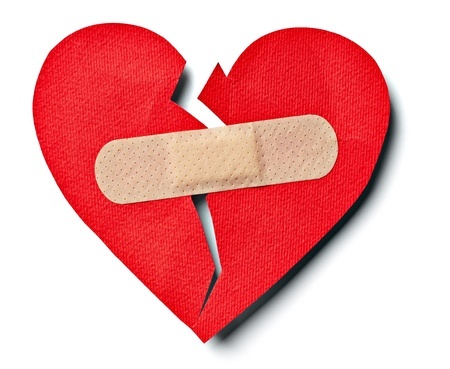Nursing a Broken Heart

Someone dear to me has lost a love relationship and engagement of many years. It’s hard to know what to say.
Adam Smith, the famous 18th century philosopher, discusses the kind of love that can lead to a broken heart and acknowledges it as a passion, that though perfectly natural, and an unavoidable part of life, is so entwined with the imagination that it is difficult for those looking on from the outside to have much comprehension. This is due to what might be viewed as its excess, perhaps embarrassing absorption in the other.
Often, to outsiders, the two people involved in a romantic love have been seized by a force they cannot resist, and that they are the only two people who exist.
But abrupt endings do happen.
Hearts can be Broken
When passionate love has been disquieted, as Adam Smith might say, the intensity of the emotion goes in the other direction. That is, when one of the two people break the bond unexpectedly, the heartbreaking, debilitating realization presents itself to the abandoned one. You weren’t as special to the other person as you thought you were.
When this happens to a friend, the extreme feeling of loss can cause her
to break apart before your eyes. The level of disappointment, anger, and
resentment she feels may surprise even herself. And, though deeply sorry,
you cannot join in those exaggerated sentiments. But you try.
If it’s you that’s suffering a broken heart and are feeling that your friends or relatives just don’t seem to be saying or doing anything that feels truly helpful, remember they are trying to support you.
These are really difficult moments for everyone.
Saving Face
When a person faces a loss like this, it’s nearly impossible to avoid
other people, particularly the ones who were around when you were in a
relationship. There's work, school, errands, appointments, social media,
and even simply going for a walk. If
it’s you, it may seem that all eyes are on you.
Unfortunately, the world doesn't stop just because you find yourself nursing
a broken heart. And muddling through daily activities can sometimes
feel as if you've been sentenced to an earthly hell.
The upside is - and yes, there really is one - you will learn just how strong
you are. Oh, sure, it may not feel like much of a source of pride in the
moment, but you'll come to understand it at a later time.
As word of the break-up goes around, you may notice people giving sympathetic
looks in your direction, whispers, and offers to listen "if you ever need
to talk." Remain reserved during this brief period. Though it
can be tempting to wail, moan, and shout a litany of evidence to tarnish your
former beloved's reputation, this must be avoided.
Gracefully acknowledge the sympathies you receive with a simple "Thank
you, I'll be fine." Contributing nothing to the gossip mill will
earn you great respect. And you never know when you could be leading
someone else through a Break-up 101 lesson.
If you decide to talk about what happened, do so with only one or two
trusted friends or family members. In fact, letting it all out to a
close confidant is recommended. You're not contributing to the gossip
mill, you're purging the many emotions and this will begin your healing
process.
Your Broken Heart Recovery Program
An important step in healing is to focus on yourself. Giving in romantic love is often unbalanced with over-giving. After a relationship, this needs to change! Attention paid to other people needs to be reigned in a little.
Self-respect needs to take the upper hand in the etiquette equation.
Here is a little advice from others who have suffered a broken heart and are happier now:
- Stop communications with the “ex.” That’s right — no more texts or any other communication. We mean it. (Because if you do, all gained ground will be lost and false hope will set in.)
- No dramatic outbursts in public. It's understandable that you may not be able to "put on a happy face" for a while, but keep the drama to yourself. You'll be glad you did.
- Let the tears flow when alone or in the company of those few trusted friends - for a few days.
- Pour over all of the pictures, notes, physical reminders of shared moments. You will cry more. For a few days.
- If it makes you feel better, go ahead and "carb out" on comfort food! For a few days.
- After a few days, stand up tall and walk around your home as you repeat to yourself, “I am breathing, alive and I’m going to get on with my life!”
- Visit your place of comfort and inspiration. It may be a church, the beach, a museum, wherever you can go to feed your soul. Thank the source of your inspiration that, though you are hurt, you are still beautiful and wonderful. Because you are!
- Begin pampering yourself! Splurge on a massage, new makeup, a fresh hair cut. Get back to the gym or yoga, or whatever else has encouraged you in the past.
- Stay away from negative self-talk and second–guessing yourself.
- Don’t play the "if only" game, or the blame game. These will not give you the closure that you need, and will only prolong your progress.
- Don’t idealize a relationship that obviously was not perfect.
After a few days of intensive self-care, try and put yourself in a frame of mind to come back out of your shell.
- Re-enter your family life with loved ones, and stay positive. This will help everyone.
- Set some new social goals.
- Re-unite with friends who may not have seen you for a long time, or take small steps in hanging out with new friends.
- You have more time now; consciously develop new interests and reconvene with the goal-setter in you!
- Clean your house and do some de-cluttering. This will help get you in "fresh start" mode.
- Enjoy the peace and quiet moments! Really get into them.
- Objectively, take different glances inside the relationship to begin to discover more about your weaknesses and strengths.
- Set some new boundaries for yourself. Become more conscious of saying "no".
- Stay positive and embrace the growth opportunity you've landed in.
- Study and begin practicing forgiveness.
But most of all, know that you will get through this. Be patient with yourself and avoid overwhelm. The day is fast approaching when staying positive won't seem like such a chore.
One day you will be thankful that you have moved on, and you might even begin practicing gratitude to the person who dropped you at the door of your new life.
You may also enjoy reading . . .














